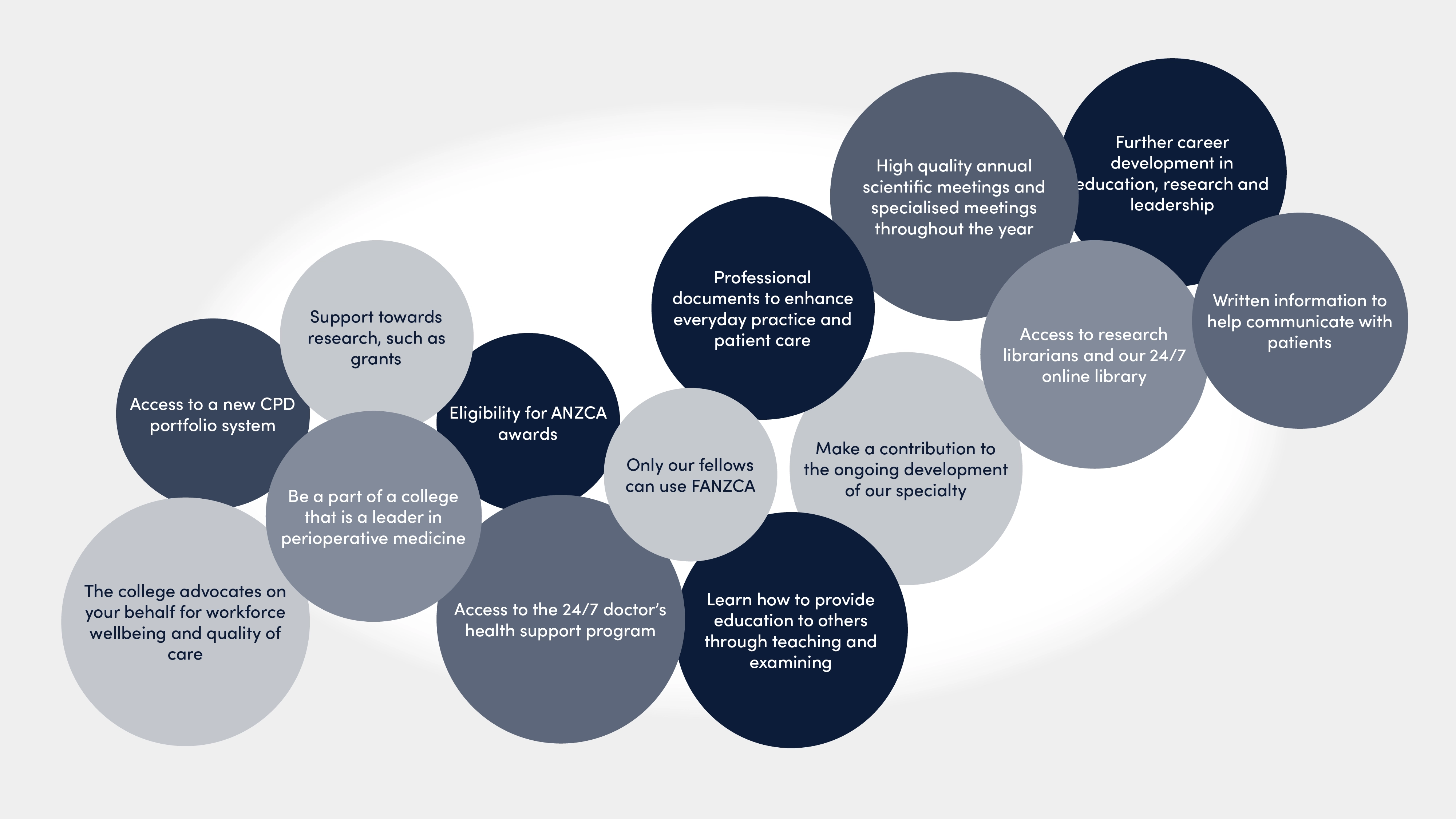EMAC for ANZCA trainees
We strongly recommend you attend an EMAC course before you begin provisional fellowship training. As the focus is on crisis management, trainees who have completed at least 12-18 months of anaesthesia training are likely to get the best benefit. The EMAC course may be undertaken at any time after completion of introductory training.
EMAC for specialist international medical graduates (SIMGs)
SIMGs on the Ahpra/Medical Board of Australia's expedited specialist pathway, including those undertaking the concurrent pathway to ANZCA fellowship are required to complete an EMAC course.
EMAC for SIMGs on ANZCA standard SIMG pathway and assessment process
SIMGs on the pathway to ANZCA fellowship are required to complete an EMAC course. The EMAC course can be undertaken at any time once you commence the expedited pathway to ANZCA fellowship.
EMAC for SIMGs on the pathway to ANZCA fellowship (the ANZCA process leading to fellowship if undertaken with the MBA expedited specialist pathway)
The EMAC course can be undertaken at any time once you commence the pathway to ANZCA fellowship.
EMAC for SIMGs on the AHPRA/MBA expedited specialist pathway
If you’re an SIMG on the AHPRA/Medical Board of Australia’s (MBA) expedited specialist pathway, completing an EMAC course is a key requirement. To help you meet the six-month timeframe, we recommend contacting us early to check current course availability.
Contact us to enquire about vacancies—we will work with simulation centres to support your timely completion.

Have you considered the pathway to ANZCA fellowship? Explore the benefits of ANZCA fellowship, including access to our world-class library, CPD resources, and a network of more than 7000 fellows. Explore member benefits, and contact our membership team to learn more.
Learn moreCourse information
EMAC is run over two and a half days, and consists of the following five modules:
- Human factors
- Airway management
- Cardiovascular emergencies
- Anaesthetic emergencies and
- Trauma management
It is taught by experienced anaesthetists and offers a valuable educational opportunity for participants to learn and practice systematic skills in a safe, simulated environment, using high-tech mannequins.
The emphasis is on small group teaching, intensive hands-on simulation practice and personal feedback. Many of the scenarios and drills are designed to build effective communication and teamwork. The course is not assessed, but participants are given direct observational feedback throughout.
Please note that there are no opportunities to complete workplace-based assessments during the course.
Find a simulation centre
ANZCA accredits simulation centres across Australia, New Zealand and south-east Asia to offer the EMAC course. Refer to the EMAC Course Handbook for detailed information on the accreditation standards and requirements for simulation centres offering the course.
EMAC courses are delivered at the following ANZCA-accredited simulation centres in Melbourne, Sydney, Perth, Brisbane, Adelaide, Wellington, Auckland and Hong Kong.
South Australia | Adelaide Health Simulation, The University of Adelaide Note: The Adelaide Health Simulation Centre will advertise the dates for their EMAC courses in early 2026. If you would like to register an expression of interest in a course at this centre, please email [email protected] and we will contact you once these dates are available. |
New South Wales | Sydney Clinical Skills and Simulation Centre |
Queensland | Clinical Skills Development Centre |
Victoria | Epworth HealthCare, Clinical Education and Simulation Centre Phone: +613 9426 8620Fax: +613 9928 4000 Email: [email protected] St Vincent’s Hospital Melbourne Phone: +61 3 9288 2900 |
Western Australia | Perth Children's Hospital, Education Centre |
Auckland, New Zealand | Simulation Centre for Patient Safety, University of Auckland - Grafton Campus |
Wellington, New Zealand | Wellington Regional Centre for Simulation & Skills Education |
Hong Kong | HKCA Institute of Clinical Simulation |
Course dates and locations
Finding an EMAC course is easy.
- Simply type 'EMAC' under 'What event/course are you looking for?' and search.
- Follow the link to the simulation centre website to register.
Important notes for specialist international medical graduates (SIMGs):
- As an SIMG in Australia, ensure you register for an Australian EMAC course.
- The EMAC support team is available to assist you in ensuring you complete your EMAC requirements. Contact us for further information and course vacancies.
EMAC course governance
The EMAC Course Sub-committee is responsible for oversight of EMAC course delivery, including the accreditation of centres, appointment of instructors, and revision of course content.
The Supervisors of EMAC Network provides a forum for the sub-committee and the supervisors of EMAC to collaborate, share, discuss and advise on challenges faced relating to EMAC course delivery.
EMAC course licence fee
The annual EMAC course licence fee is confirmed on an annual basis following the November council meeting. An invoice is sent to all simulation centres following this meeting. Payment is required by 30 January, annually. For enquiries, please contact us.
Testimonial
"EMAC was a brilliant course. I really enjoyed it and found it the most helpful simulation-based course I've done. I would strongly recommend it to all anaesthetists."
- Recent EMAC participant and a senior consultant having gone through the SIMG pathway
Become an EMAC Instructor
Being an instructor is a great way to build your experience and impart your knowledge and skills within the crisis management space.
Pre-approved simulation instructor courses
The simulation instructor courses below have been pre-approved by the EMAC Course Subcommittee as suitable for those wishing to apply to become an EMAC course instructor. Please contact centres directly for course dates and further information.
Any changes to Instructor course content or course leadership will require a revised application to be submitted to the EMAC subcommittee.
| New South Wales | Sydney Clinical Skills and Simulation Centre |
| Queensland | Clinical Skills Development Service |
| Victoria | Alfred Health, Alfred Simulation Centre |
| Western Australia | Sir Charles Gardner Hospital |
| New Zealand, Auckland | NetworkZ, Auckland City Hospital |
| New Zealand, Wellington | National Patient Simulation Training Centre, Wellington Hospital |
| Boston, MA, USA | Center for Medical Simulation (CMS) |

